Conversation was lively at the monthly RNA Oxford lunch last week, as it always is, but I found one topic particularly interesting. This may have something to do with the fact that I initiated the topic! It was about what was fair to the reader and what wasn’t.
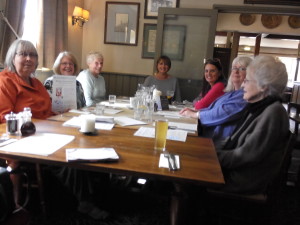 Caught by the camera while waiting for others to arrive, Barbara Hudson, Heather Rosser, Maggi Fox, me, Jean Fullerton, Janet Gover, Mary Nuttall
Caught by the camera while waiting for others to arrive, Barbara Hudson, Heather Rosser, Maggi Fox, me, Jean Fullerton, Janet Gover, Mary Nuttall
I remarked that I’d been very disappointed at the end of the thriller I’d finished the night before, Broken Promise, written by one of my favourite authors, Linwood Barclay, as I hadn’t found the conclusion a satisfactory one.
I’m always gripped by Linwood Barclay’s novels, and Broken Promise was no exception. Slightly unusually, though, there were two main story lines. I’d predicted the ending of one of the story lines, and when I finished the book, I was pleased to discover that my prediction had been correct.
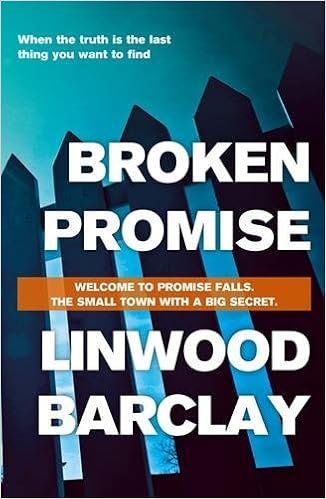
I also had ideas about the second main thread in the novel, and wanted to know if I was right, but when I reached the final page, I found that the thread had been deliberately left open. Instead of a satisfactory conclusion to this story line, too, the reader was given a chapter from the opening of what was going to be the second in the series.
I hadn’t realised that Broken Promise was the first of a series, the Promise Falls Series, but even if I had, I don’t think I’d have been any less disappointed as I expect every novel that I read to be complete in itself.
In the ensuing discussion, I quoted the Montana Sky Series Novels written by Debra Holland, several of which I’ve read, and said that each story in the series was satisfactorily rounded off, even though each contained a hook within it that intrigued the reader about a subsidiary character.
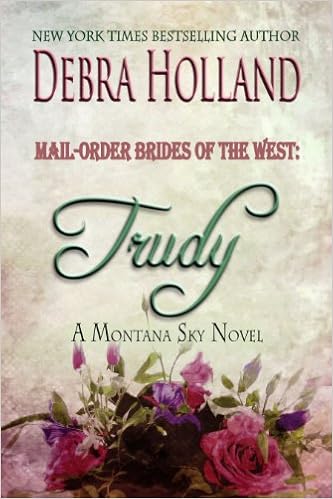
But that subsidiary character isn’t part of the main story line, so the fact that their story isn’t developed or resolved doesn’t stop the novel from reaching a satisfactory conclusion. Nevertheless, the reader is intrigued about what happened to that other character and, needless to say, that other character’s story is the next in the series.
Leaving a main story line open, I saw as a ‘don’t’: intriguing the reader into wanting to get the next book, I saw as a ‘do’.
In our discussion, I realised that I was the only one at the table who felt strongly cheated at the end of a series book if I found that I had to buy the second book in order to conclude a story line started in the first, and I’m curious to know if others feel as I do.
Does anyone else feel as I do?
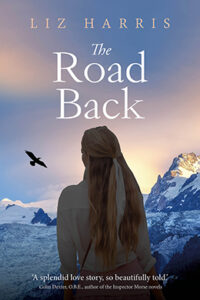
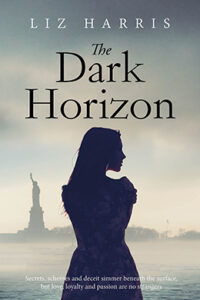
I agree with you, Liz. I actually threw Connie Willis’s ‘Blackout’ on the floor for this reason and have vowed not to buy the sequel (really Part 2) or anything else by her. It’s a dirty trick, treating the readers like mindless consumers.
As a series writer, I strive to end each book with a proper resolution relevant to that particular story. I leave secondary ‘plotettes’ here and there so there are tiny threads for readers of multiple books in the series to pick up, but absolutely nothing central.
You’ve said exactly what I think, Alison. One shouldn’t have to buy two books in order to find the solution to the mystery that formed the basis of one book. Also, by the time that the next book comes out, one will have forgotten the key elements of the unfinished story line in the first, and one will no longer care about the resolution. It’s possible, too, that if one story line could be stretched over two books, it could be stretched further still into yet another in the series!
Exactly so!
Clever series, e.g. Lindsey Davies’s Roman detective Falco, have a developing thread that runs through the 20 books: the central relationship that matures, children, friends and colleagues’ stories, but none of the books is contingent on the others. Series can be extended by telling secondary characters’ stories and prequels, but the same ‘rules’ apply – do not diss your readers!
That sounds the perfect way in which to develop the series. Thank you for your comments, Alison.
I enjoy linked books where characters pop up from other books and I also love writing those sort of books, but I think unless you know it’s a series and are prepared to buy the next ones, then it should be a complete story so you’re not cheated at the end. I remember I once got books 1 and 2 of a series at a cheap book shop, then feeling so dissatisfied I had to go and order a full price part 3. Then it was hugely annoying as the author had messed up an element of the plot and I had to go back and check I hadn’t missed anything. I hadn’t, but it really spoiled the series for me as this necklace was soled in book 2 by her drunken husband, then in book 3 she had it in a trunk under her bed. She had never gotten it back as far as I could see!
Thank you for your comment, Kirsty, and for pointing out something I hadn’t considered – continuity. The editors of our single novels have a hard enough task, checking that there’s a consistency and continuity throughout, but it must be so much more difficult, for both author and editor, to keep track of what’s happened in earlier books in the series and relating it to later books. How galling for a reader to find, as you did, that there was a factual error in the narrative of a later book.
Hi Liz
I agree with you completely. I prefer books to completely stand alone and for each part or thread of the book to conclude.
However, I’m now stuck with the dilemma that I’ve been asked to link my book and albeit I don’t really want to. I feel as though I should comply.
Currently trying to re-write a whole novel with a link
Xx
Another who agrees with me! Every key narrative thread should have a conclusion in the book if which it’s a significant part of the story. How difficult your task sounds! Are you able to pick out one character from the first novel, and develop that character’s story as a second novel, or would that not be sufficient a link?
Liz, that is so weird. My husband Dave has just finished the novel you mentioned and came away with a very disgruntled face. He felt that the novel was simply a thinly veiled taster for the next one – he felt very short changed. Thought you might like a male/non writerly response. BTW, I don;t think that he realises the book is one in a series, I’ll tell him that. But I fear the damage has been done !!
That’s amazing, Lizzie!! I, too, had no idea that that was the first in a series. I’m so annoyed that I won’t buy the second. Yet I love his books. My favourites probably are ‘Fear the Worst’ and ‘The Tap on the Window’. His books always keep me reading too late in the night!
I love a series, I love to see subsidiary characters have their own story, and I don’t mind a theme or puzzle running through the story linking books together. However, I HATE books where the story doesn’t stand up on its own or you cannot understand what is going on without reading the rest of the series! Each book should stand alone as well as part of a team, otherwise, its shameless commercialism.
And I say that as an author who is now writing her first series…
I, too, am happy to meet the same characters again, Sue, and to go back to the same town or village, for example, but I expect the key story in each book to be resolved. I was surprised at the lunch to be the odd (in the nicest possible way, I hope!) one out. We spend so much timer as authors talking about endings and discussing whether there should be a HEA ending to a romantic novel. Yet, with series’ novels, some people obviously see the series as, in effect, one very long novel that’s been broken up into segments. Good luck with your series, Sue, and thank you for commenting!
I much prefer standalone books, but I don’t mind a series which show a main character growing and changing, outside the main ‘plotline’ of the story. But I hate to feel that I’ve been swindled into buying books I wouldn’t necessarily have bought, just to get the resolution of the story that started in Book One!
‘Swindled’ and ‘commercialisation’, which has also been used, are apt words. I felt I’d been cheated – or ‘dissed’ as has appeared in another comment.
Thanks for coming to my talk on Brushstrokes in Time in the festival marquee today along with some others in your photograph.
I hope you enjoyed meeting my friend the artist Weimin He. I know he was interested in the background to The Lost Girl.
Many thanks for reading the blog and commenting, Sylvia. I enjoyed your event yesterday, and couldn’t help noticing the long line of those wanting to buy your novel after your talk. I very much enjoyed meeting Weimin He. He’s taken details of ‘The Lost Girl’ as he wants to read it. The history behind it was new to him.
Completely agree with you, Liz.
I think it’s like the difference between a serial and a series on TV. The former is one continuing story and individual episodes can end with a cliff hanger (which I HATE in a book) and the latter is standalone stories but with the same characters and a developing thread in their characterisation etc (which I enjoy in a book and can choose whether I enjoy it enough to read more).
Many thanks for your comment, Clare. What an excellent analogy! You’ve captured the difference in a nutshell. Cliffhangers work well at the end of a serial, although it’s frustrating as you have to wait for the next episode – I have to wait until next Saturday for the final two episodes of ‘Follow the Money’ and it’s killing me – but that’s what one expects, and hopes for, from a serial. To be kept in suspense until the next book comes out is not what I expect from a series’ novel, though.
I was delighted to meet up with Jean Fullerton at the RNA Ox lunch. As my NWS reader Jean has been very supportive and was delighted to hear that In the Line of Duty is making its mark.
This week has illustrated for me the importance of authors supporting each other. In the photo of the Oxford lunch I am holding up Barbara Hudson’s invitation to the launch of her debut novel, Timed Out. On Saturday afternoon I went to her excellent talk about the book at the Oxford literary festival. In the morning I went to hear Sylvia Vetta talk about her debut novel, Brushstrokes in Time, about a young Chinese artist and the Stars art movement. Throughout her talk, real life artist Weimin He sketched her and the audience in the Blackwells marquee in the quadrangle of the Bodleian Library and presented it to her afterwards.
Heather
As you rightly point, out, Heather, the members of the Oxford Chapter of the RNA, the monthly lunches of which are known as ‘the Ox lunch’, and also of the Oxford Writers’ Group, whose members overlap, are tremendously supportive of each other. The friendship and mutual support in both groups is something to be greatly valued, and also the enthusiasm for discussing aspects of writing. Scarcely a month goes by when there hasn’t been an interesting, thought-provoking discussion in the meeting of one, if not both, of these groups.
Liz,
I’m very much with you and Alison on this. Books where the threads are left open (whether in a series or not) are – for me – simply unsatisfactory.
A good writer can leave the characters poised to move on (to book 2, etc.) while still closing the threads and resolving the basic plots.
Cheers!
John
That’s it in a nutshell, John. Thank you for that.
I couldn’t agree with you more Liz. As an avid reader I believe we all want satisfactory conclusions, whatever the genre. Who wants to wait another year to find out how something ends!
I like reading books where existing characters are carried forward because, as a reader, we invest in them but I do believe the story should be a stand alone. Elaine
That’s exactly it, Elaine. I, too, can’t see any reason either why series books should be treated differently from any other stand-alone novel in any genre. A basic requirement for any novel is that there’s a satisfactory conclusion to the book, be it happy or sad. If the story is left incomplete, by definition there is no satisfactory conclusion. Many thanks for your comment.
Great post, Liz. I love Linwood Barclay’s books too, but haven’t come across this one, so thanks for the warning! I’m writing a crime series at the moment, featuring the same two central characters, and share Alison’s approach, above. Each book can be read as a standalone, but subsequent stories develop sub-plots and the central relationship. As an aside, I think blurbs in this area have to be handled carefully. I was following one of Alexander McCall Smith’s series and, when trying to identity the next one in the sequence, accidently picked up book 3 instead of book 2, and thus stumbled across a major spoiler.
It sounds as if you’re writing your series exactly the way I like, Clare. I look forward to its publication. You know how much I enjoyed ‘You Think You Know Me’. That’s a very interesting point you made about blurbs. I hadn’t thought of it before, but you’re right – one must be careful not to give away on the back of a later novel something that has happened earlier in the series for the very reason you say. Many thanks for making that point.
I found this a very interesting discussion. I love Robert Goddard’s twistily plotted novels, but it was only after reading The Ways of the World a couple of years ago that I realised, from the cliff hanger ending, that I wouldn’t get no satisfaction til I’d read the sequel, The Corners of the Globe. I didn’t get around to this and have since discovered the latter book is the second in ‘The Wide World trilogy’. Gah!!
I don’t how I missed this at the time of reading the first of the three books. At any rate, I still think Robert Goddard is a peerless suspense writer but I just wasn’t invested enough in the machinations of the Treaty of Versailles to persevere with the characters for three books (even if they do rejoice in such brilliant monikers as Schools Morahan, Malory Hollander and Sam Twentyman).
Thanks for a fascinating topic.
I don’t know Robert Goddard’s novels, Gabrielle, but I completely take your point about how much time, and what a feat of memory, is involved if you are to retain the threads of possibly more than one plot over several novels. It must be phenomenally difficult for the author to keep track of what’s happened in each of the novels, and of the ways in which the events in one novel impact upon what happens in another, just as it is for the reader. Many thanks for your interesting comment.
Hi Liz
Just a quick comment about series. I’ve always found that my readers love them! But the trick is very definitely to make them stand-alone but nevertheless linked novels. That way, the reader has a satisfying conclusion to each story, but also you’ve seen what’s happened in the meantime to characters in earlier books, but without revealing any spoilers from their earlier story. This tends to make the reader want to get stuck into any earlier titles they’ve missed, or the next in the series, so it’s the best of all worlds! Many years ago, I had a new publisher who only published shorter books, so I had to split the story into two. That got me some bad press as some readers didn’t realize they had to read the sequel to find out what happened. I will never, ever let that happen again! So that proves my point: series, definitely, but each title needs a satisfying ending. But yes, you do need to keep copious notes for continuity!
See you soon, and thank you for a most interesting blog!
Many thanks for your comment, Tania. I agree one hundred percent in the way in which you describe a series novel. Re the splitting of one novel into two, perhaps each part should have been described as being one of a serial so the readers would have known what to expect. With a sequel, I expect it to read as a standalone, but I would also expect a little more backstory relating to the first of the novels than I would in a series novel. I don’t know if you saw it, but a comment earlier on pointed out how important it was that the blurbs for books that come later in the series avoid giving away any spoilers to what has happened in earlier novels.